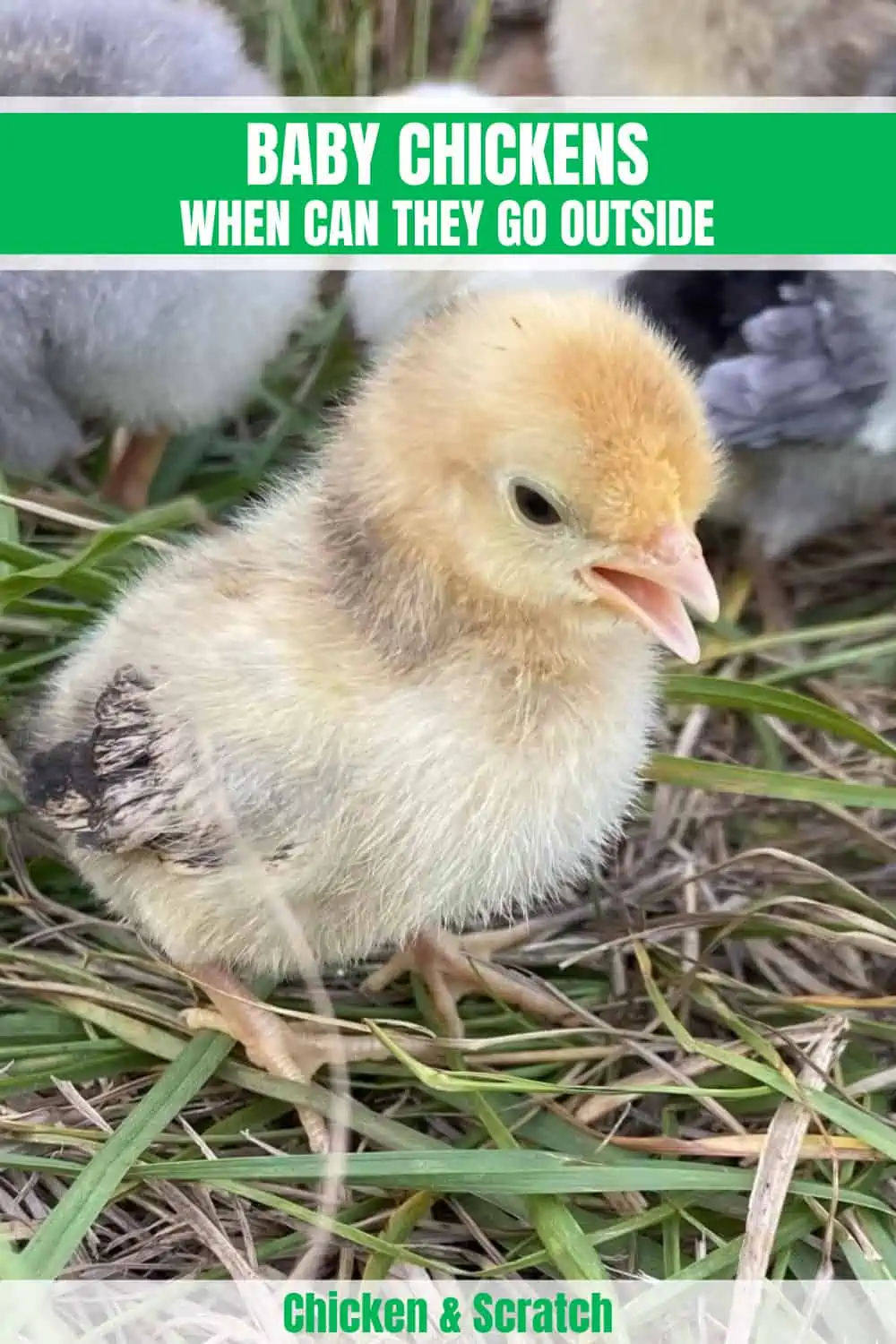When you embark on the journey of raising chicks, it comes with many challenges. For instance, you’ll have to decide where to put them and how to keep them safe and warm. Another consideration is moving them to the chicken coop. When can chicks go outside? Here’s some information.
When Can Chicks Go Outside?
So, when can chicks go outside? It depends. There are a number of factors to consider when deciding to send your chicks out with your fully grown chickens. Factors include:
- Time of year
- Species
- Size
Time of year is a major consideration. If you’re moving baby chicks in the summer, then your babies may need extra care for just a week or two. However, if you’re taking them outside in the winter, then they’ll need supplemental care longer.
Observe how mother hens manage their babies. After baby chicks hatch, the mother hen will keep them warm underneath her almost constantly. The babies will venture out here and there. When they do, they explore. They also eat and drink. If they get cold, they return to their mother to warm up.
It doesn’t take the chicks long to spend more time out in the pen instead of under their mother. Some mother hens will keep a complete distance from their chicks when they are around five or six weeks old. When your chicks are about six weeks old, start assessing them to see if they’re ready for the coop.
Assess How Feathered Your Chicks Are
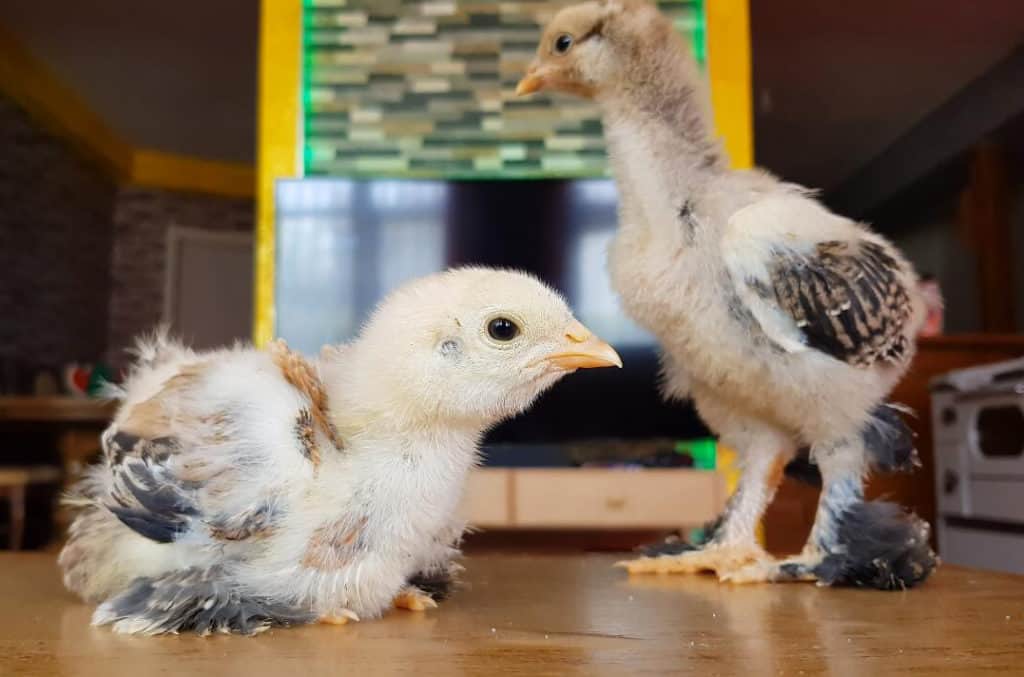
In most cases, baby chicks are completely feathered by the time they turn six weeks old. This means that they’ve lost their down and have grown actual feathers. When chicks get feathers, they are able to manage their body temperatures.
The time that chicks grow real feathers varies according to breed. Regardless of age, make sure that your chicks have actual feathers before sending them to live in the coop.
Consider the Season
Temperature considerations for chicks start from when they hatch. The temperature that you keep the brooder at should be between 90 degrees Fahrenheit and 95 degrees Fahrenheit. This is for the first week after your baby chicks have hatched.
After that first week, start decreasing the temperature in the breeder by about 5 degrees Fahrenheit. Do this every week until the brooder temperature is close to the temps that are in the surrounding space. This temperature recommendation is merely a guideline.
To keep your baby chicks healthy and safe, assess how your chicks are acting. When they start spending more of their time away from the heat source, you can decrease the heat. Once they’re spending very little time close to it, you can remove it entirely.
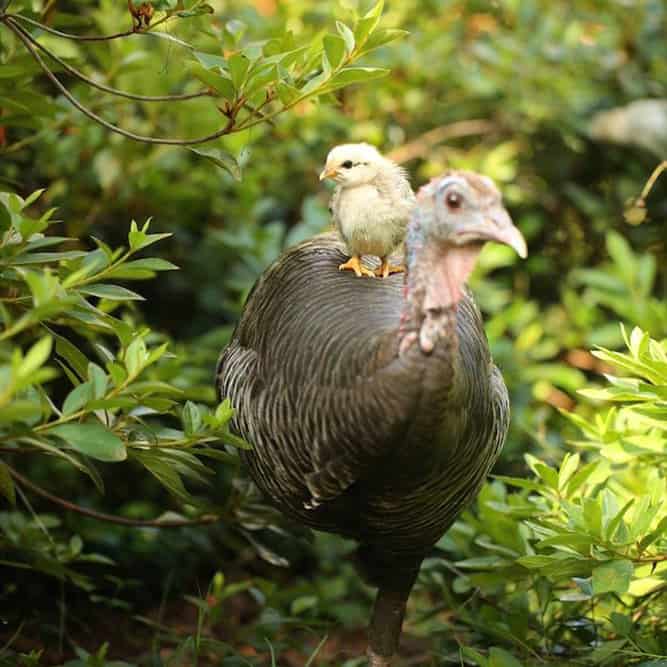
When can you move chicks outside? The best time to move chicks to the coop is when they no longer need a heat source. If the temperature outside is 65 degrees and your chicks are 6 weeks old or older, they shouldn’t need supplemental heat.
When you first move your baby chicks outside, pay attention to them. If they are making a lot of noise, then they are unhappy. Keep in mind that a chilly chicken and one that’s only uncomfortable in a new place make different sounds.
Once adolescent chickens become comfortable in a new environment, they’ll start to explore. They’ll scratch and eat, becoming content and quiet. If your chickens are squished up together in a corner and making a lot of noise, they are probably cold. In this case, you’ll want to give them an outdoor heat source.
Assess Your Coop Situation
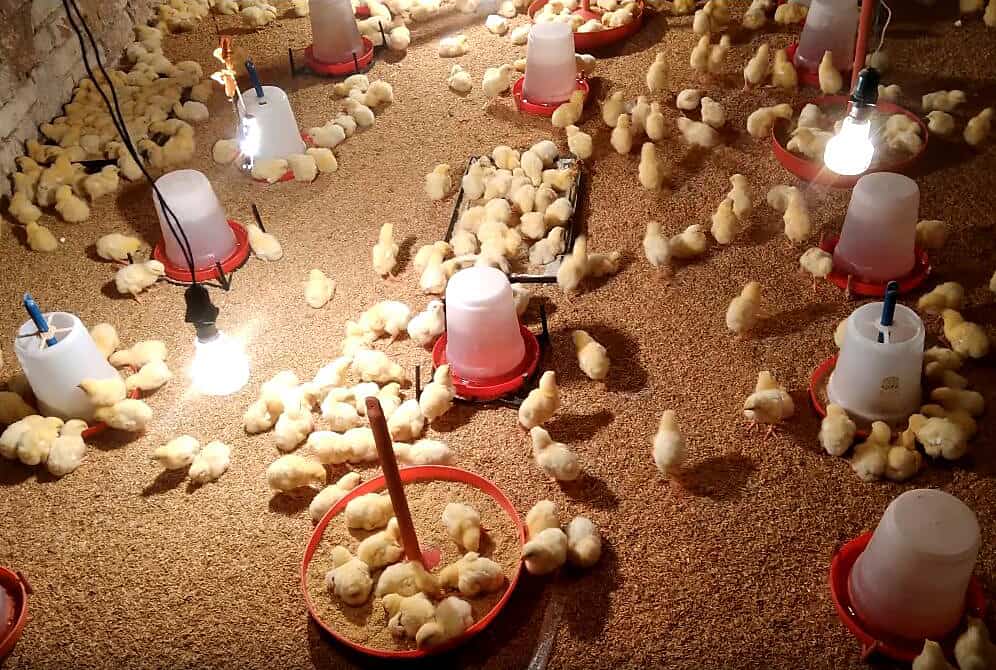
If you are moving your baby chicks into the coop during a cooler time of the year, assess your coop. For instance, check:
- On the heat source
- How safe the coop is
- The number of baby chickens that you have
- If you have older chickens
Is there an electrical source available to heat an area of the coop? Also, can you add heat in a way that’s safe? If this isn’t possible, then don’t move your chickens outside until they’re older or it’s warmer.
Before transitioning your chickens to the coop life, make sure that it will protect them from predators. Keep in mind that predators include foxes and coyotes as well as dogs and cats. Your chickens aren’t just at risk from any domestic pets that you have.
They are in danger from neighbor animals as well. The noise and smell of your chickens will attract predators. It’s also important to prevent them from escaping the coop. Visit your local hardware store or farm company for the equipment you need to protect them from themselves and predators.
When can chicks go outside? The number of baby chickens that you’ll be moving from the brooder to the coop also makes a difference. Every chicken produces heat. When you have more chickens, it’s easier for them to stay warm. They share heat to keep one another comfortable and toasty.
Older chickens are another consideration. If you have mature chickens who have already claimed the coop, then wait until your new babies are bigger. In fact, wait until they are close to the same size as your current flock. Mature birds can seriously harm adolescents via the famous pecking order.
The process of integrating baby birds with an existing flock should be a slow one. In fact, consider using The Playpen Method. This technique involves placing your new babies in a separate enclosure inside the coop.
If you try it, confirm that the separate enclosure allows the adult birds to see and adjust to the babies. This technique tends to decrease the stress of the integration since it prevents conflict.
Work to Make the Coop a Home
Moving chicks from the brooder and into the coop will confuse them. To decrease their stress and make the transition as easy as possible, give them time to acclimate. You need to enforce that the coop is now their home and where they should go at night.
Keep the juvenile birds inside your chicken coop for a few weeks before letting them out into the run area. When chicks don’t receive the time to adjust to the new space, they might not return to it at night. This can be frustrating for you and deadly to your chickens. It’s possible to coop train chickens that are adults, but it’s easier and more effective to do it initially.
While you’re coop training your baby chickens, remove nest boxes from the coop. Stressed out chicks are likely to hide in nest boxes. When chickens are asleep, they poop. The pooping isn’t an issue at first, but once they start laying eggs, it becomes a problem. Chicken poop on fresh eggs increases your risk of becoming ill when you eat them even if you wash them.
Block or remove nesting boxes to stop your baby chickens from getting used to sleeping inside them. Preventing the behavior altogether is a lot easier than trying to stop them later. After your newest chicks are 17 weeks to 18 weeks old, you can give them access to the boxes.
If there are hens laying eggs in your coop currently, close the boxes in the afternoon. This is the time when hens are done laying eggs for the day. Then, reopen the boxes early in the morning to give them access.
Take Time to Bond with Your Chickens
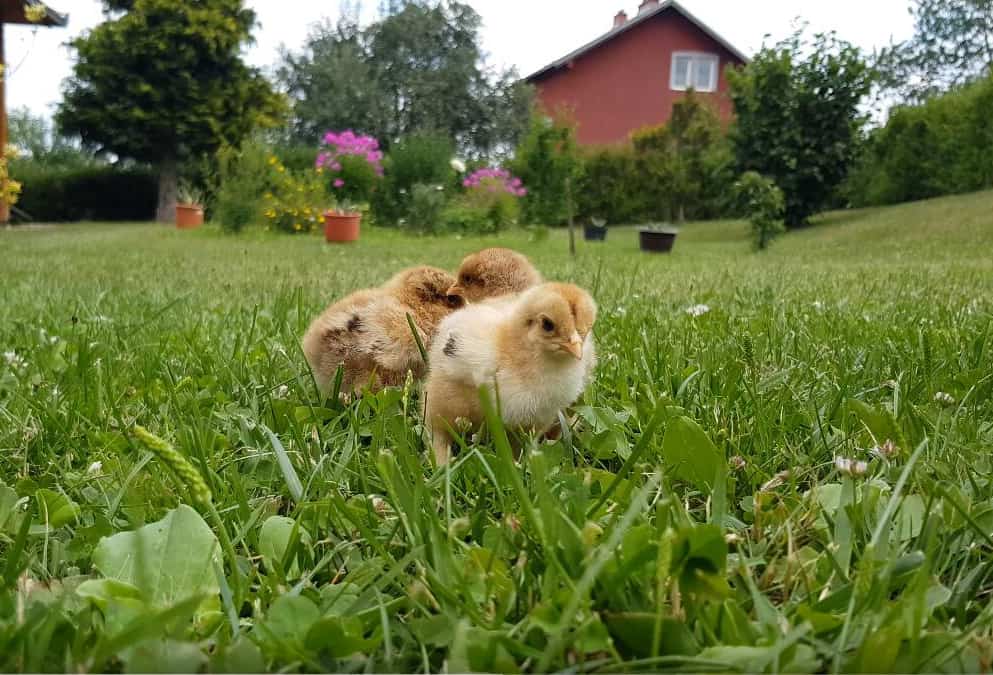
When you start the process of introducing your baby chickens to the coop, bond with them. Spend time with them in the run. Bring some reading materials, and enjoy the warm weather. Get to know the personalities of your chickens. As they become adults, it will be beneficial to know them.
If you own other animals, be sure to keep them separate from your juvenile chickens. These birds often exist with other pets easily but introduce your young birds to your other animals slowly. Chickens are easily stressed. You can decrease their stress with slow and careful introductions.
Small children can also stress out chickens. Toddlers are cute, but they are usually loud and often make fast movements. Kids might also want to hold their baby chickens before the birds are ready.
If you permit this, then it will be harder for you to bond with your chickens. Once you know the temperament of your birds, you’ll know which ones will permit young children to handle them.
Remove noisy disruptions. Contain your chicken in a peaceful area of your home or exterior spaces. A quiet shed is a great place to bond with your chickens. If you have them inside your home, keep televisions and radios turned off until you move them to the coop. Be kind to your birds and treat them well always. That way, they’ll trust you, and they will feel safe with you.
Doing What’s Best for Your Baby Chickens
When can chicks go outside? Before placing your baby chicks into the coop, consider their age, feather growth and the number that you have. You should also consider the exterior temps, size of the mature members of your flock and modifying your chicken coop to prevent them from hiding inboxes.

Joseph Hudson has been raising chickens for over 15 years. In 2018, he completed the Agriculture & Natural Resources program at Mt. San Antonio College. He currently raises over 1400 chickens on his 7.5-hectare farm. He keeps sharing his experience on raising healthy and happy chickens on Chicken Scratch The Foundry.

